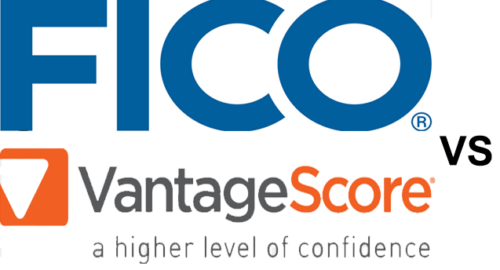The reason why each credit card company provides a different credit score is because they use different credit scoring models to calculate your score. Each scoring model may weigh factors differently or use different algorithms to come up with a score. Remember, it’s possible to check your own credit without hurting your score. Here’s a brief overview:

- Chase (Experian): When you check your credit score through Chase Credit Journey, you’re viewing a VantageScore 3.0® provided by Experian. VantageScore is one of the three major credit scoring models in the U.S. so Experian calculates credit scores based on the information in your Experian credit report.
- Discover (FICO): On the other hand, Discover provides a FICO score, which is the most widely used credit score by lenders. FICO scores consider various factors, including payment history, credit utilization, length of credit history, types of credit, and recent credit inquiries. FICO scores are one of the most widely used credit scores and are calculated by the Fair Isaac Corporation. FICO scores are based on information from all three major credit bureaus (Experian, Equifax, and TransUnion), so it may be slightly different from the score you get from Chase, which only uses Experian data.
- Capital One (Credit Wise): Capital One’s Credit Wise also provides a VantageScore, similar to Chase Credit Journey. Again, this score might differ from your FICO score due to variations in the scoring models and the data each agency has access to. Like FICO, VantageScore considers information from all three major credit bureaus.
So why is there a difference if they all use similar credit reports or all three of the reporting agencies?
Why the Discrepancy?
- Scoring Models: Different scoring models weigh factors differently. For example, VantageScore may emphasize certain aspects more than FICO, leading to variations.
- Data Sources: Each credit bureau (Experian, TransUnion, and Equifax) collects slightly different information about your credit history. Consequently, the scores they generate may vary.
- Credit Report Updates: Not all lenders report to all three bureaus simultaneously. If a particular lender reports to only one or two bureaus, it can impact your scores differently.
- Credit Utilization: The utilization of available credit (credit card balances relative to credit limits) fluctuates which is a factor in your credit score
In summary since reporting isn’t always real time and creditors can vary on which credit reporting agencies they report to, scores will be different based on these issues.
FICO vs. VantageScore: A Breakdown
Both FICO and VantageScore range from 300 to 850, with higher scores indicating better creditworthiness. FICO scores are more widely used by lenders, but VantageScore is gaining popularity, especially among newer lenders and financial institutions.
Weighting of Factors: FICO and VantageScore assign different weights to the various factors in your credit report. Here’s a general breakdown:
- FICO:
- Payment History (35%) – Lenders assess whether you’ve paid past credit accounts on time. This is the most critical factor in your FICO score.
- Amounts Owed (30%) – This refers to credit utilization ratio (amount owed divided by credit limit)
- Length of Credit History (15%) – Longer credit history is generally positive, but not mandatory for a good score.
- New Credit Inquiries (10%) – Opening new accounts can impact your score temporarily.
- Credit Mix (10%) – Having different types of credit accounts (credit cards, installment loans, etc.) can be viewed favorably.
- VantageScore:
- Credit Utilization (20-30%) – High utilization may impact your score.
- Age of Credit History (15-20%) – Longer history is positive but not mandatory.
- Credit Rating (20-30%) – This might be based on a different model than the traditional FICO score.
- Recent Credit Behavior/ Inquiries (10-15%) – May consider a wider range of inquiries than FICO.
- Public Records (10-15%) – Includes bankruptcies, foreclosures, etc. (FICO may also consider these but the weightage might differ).
FICO scores are usually the go-to for lenders, but basically, both scores give a good idea of how creditworthy you are. You should keep an eye on both your FICO score and VantageScore to really understand how your credit is doing.
Are Vantagescore and Creditwise basically the same thing?
No, VantageScore and CreditWise are not exactly the same thing, although they are connected. Here’s the breakdown:
- VantageScore: This is a credit scoring system, one of the major ones along with FICO. It uses information from your credit report to generate a numerical score (300-850) that reflects your creditworthiness.
- CreditWise: This is a service offered by Capital One (bank). CreditWise provides users with free access to their TransUnion credit report and a VantageScore (usually VantageScore 3.0). So, CreditWise offers the platform to view your credit information, but VantageScore is the actual scoring system used.
Notations and Abbreviations you might be interested in:
You might see TU F8 (Trans Union Fico 8) or EX VS3 (Experian Vantagescore 3.0) or EFX F8 (Equifax)
- FICO 8 using Experian data
- FICO 8 using Equifax data
- FICO 8 using TransUnion data
- VantageScore 3.0 using Experian data
- VantageScore 3.0 using Equifax data
- VantageScore 3.0 using TransUnion data
For Capital One products listed on this page, some of the above benefits are provided by Visa® or Mastercard® and may vary by product. See the respective Guide to Benefits for details, as terms and exclusions apply.
Opinions expressed here are the author's alone, not those of any bank, credit card issuer, hotel, airline, or other entity. This content has not been reviewed, approved or otherwise endorsed by any of the entities included within the post.
Compare the top Excellent Credit Card Offers - CreditSoup Balance Transfer Cards
